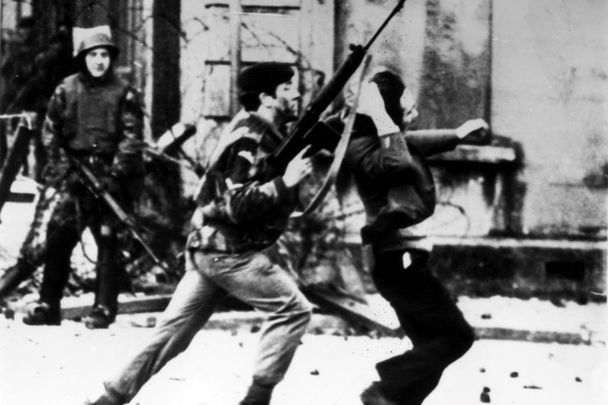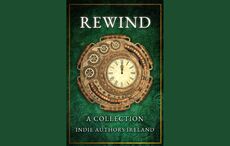The British government has announced the appointment of an academic advisory group to oversee the work of “independent and qualified” historians who will be tasked with reporting on “the public history of British policy” during the Troubles. The government has committed to giving the historians access to secret State files on the conflict.
A recently issued report, entitled “Bitter Legacy: State Impunity in the Northern Ireland Conflict,” is a good place for them to start.
That report was commissioned by the Committee on the Administration of Justice in Belfast and the Pat Finucane Center in Derry and released by the Norwegian Center for Human Rights. It focused on three areas involving criminal conduct and the extreme abuse of State power: first, “direct killings by state forces;” second, “torture and ill-treatment by state actors,” and third, “killings attributed to non-state actors where there are allegations of collusion with state actors.”
According to the report, impunity derives from the State’s failure to hold perpetrators of these types of violations accountable. Impunity is the freedom to act without fear of punishment or consequences even when, as here, the conduct is unlawful and harmful to others. The report concluded that State impunity during the Troubles was “widespread, systematic, and systemic,” and went far beyond a few “bad apples” as the government claimed.
In the first section, the report noted that State actors killed 374 people between 1969 and 1998. The victims were disproportionately Catholic and “over 70% were indisputably unarmed.” Despite Bloody Sunday, the Ballymurphy disaster, and other cases, only four British Army soldiers were convicted of killings during that period. All returned to the army afterward. In 2022, a soldier was convicted of manslaughter for killing an unarmed man in 1988. He was given a suspended one-year jail sentence.
The report analyzed investigations involving 54 deaths and found that a majority were “superficial and incomplete, with a clear failure in many instances to perform some of the most obvious and rudimentary steps.” Examples of gross police incompetence included conducting inferior witness interviews, committing forensic mistakes or omissions, and failing to follow up on lines of inquiry. The government conducted an “Article 2” (European Convention on Human Rights) compliant investigation, which is required by law, in only a few of the cases.
In the “torture and ill-treatment” section, the report highlighted the historic “Hooded Men” case, which goes back to the imposition of interment in August 1971. The case has been decided by the European Court of Human Rights twice, yet some aspects are still ongoing in the Northern Ireland court system. The report noted that, while the Police Service of Northern Ireland has “apologized” for the Royal Ulster Constabulary’s (RUC) role in subjecting the Hooded Men to the 5-techniques of in-depth interrogation, the British government has not.
Interestingly, a week before the “Bitter Legacy” report was released, the Northern Ireland Court of Appeal quashed the murder conviction of Patrick Thompson. He was found guilty in a Diplock court of blowing up four British soldiers in 1975. Thompson was interrogated five times without a solicitor present. He denied responsibility during the first three sessions, gave a verbal account of involvement signed a statement during the fourth, and collapsed in pain after the fifth session. He alleged ill-treatment during interrogation, claiming he was punched and kicked in the ribs, forced to stand against a wall and do press-ups, subjected to verbal abuse, and had his head covered in a tied plastic bag for about a minute. The Diplock judge admitted the confession into evidence, finding the police officers “honest and truthful” and “most impressive.” The judge made clear that the conviction hinged on the confession. Thompson received a life sentence.
After losing in the Court of Appeal, he applied to the Criminal Case Review Commission (CCRC), claiming he was a victim of “prolonged, intended violence to coerce a signed confession” with false admissions. After discovering that one of the detectives who took Thompson’s confession had a conviction reversed in a different case because he had lied on the witness stand, the CCRC referred Thompson’s matter back to the Court of Appeal.
In the second appeal, the court threw out the conviction. Contrary to the credibility finding made by the trial court, the appeal court ruled “the detective inspector who took the confession was clearly not a man of integrity.”
Writing for the second appeal court, Lady Justice Siobhan Keegan said: “We are of the view that if the trial judge had been aware that the detective inspector had the potential to falsify a confession, as he was subsequently found to have done in another case years later, he may have been compelled to have ruled the confession inadmissible.” The court noted as an additional factor “that there was now cogent evidence of ill-treatment allegations made against other police officers who were present” for Thompson’s interrogation, which “raise the possibility that there was potentially a culture of oppressive behavior” in dealing with suspects at the RUC station. This case illustrates how the failure to hold State actors to account breeds a culture of contempt for the law and impunity.
Cases involving collusion - that is, matters where the State was directly involved in or “turned a blind eye” to the criminal acts of non-state actors - were considered in the “Bitter Legacy” report’s third section. The report found that collusion was a government tactic and an “often deep-seated feature of the practice of state agencies throughout the entire conflict.” Additionally, it stated collusion is something that “cannot be relegated to the actions of a few rotten apples.”
The report analyzed dozens of murders investigated by the Northern Ireland Police Ombudsman and determined that police behavior - including losing evidence, withholding intelligence, destroying evidence and documents, protecting informers, and failing to pursue investigations into suspects, weapons, and vehicles - contributed to impunity. Additionally, and tragically, lives that could have been saved were lost, the report said.
The institutional failure to investigate criminal misconduct involving State security forces has denied victims’ relatives their right to justice and truth. Without that right, they are denied closure and healing. The report notes the new Northern Ireland Troubles (Legacy and Reconciliation) Act will fail to deliver this right, because it removes investigative avenues of redress for victims’ families in lieu of a review process with a “weaker investigative mandate.” The report calls for a return to the legacy and truth recovery mechanisms in the 2014 Stormont House Agreement.
Overall, according to the report, the State’s failure to deliver the truth and hold perpetrators accountable weakens public trust in government, undercuts the rule of law, and reinforces impunity.
One of the report’s authors sagaciously asks, “[h]ow can the United Kingdom speak with moral authority abroad when it’s hiding all these things?” That’s a good question to ask, and one that the group of historians responsible for analyzing and publicly reporting on the history of British policy during the Troubles should answer.
This article was submitted to the IrishCentral contributors network by a member of the global Irish community. To become an IrishCentral contributor click here.




Comments